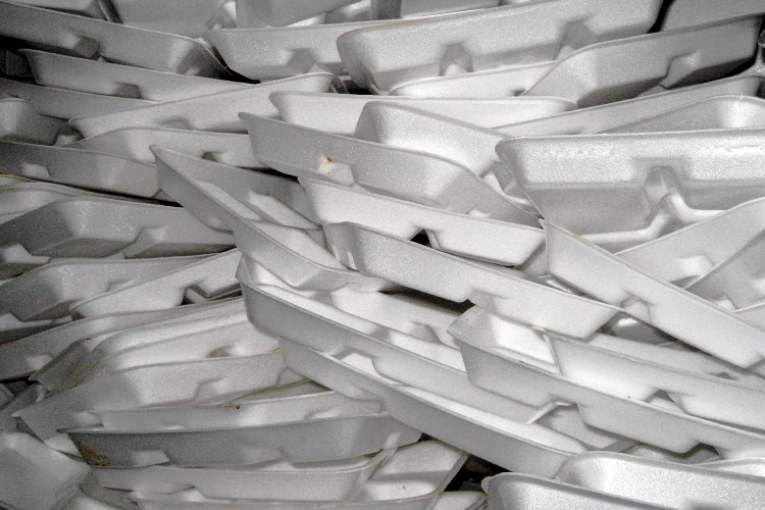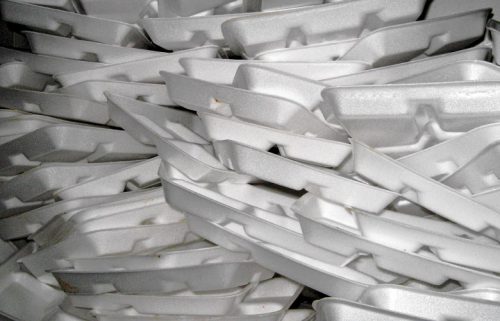

The Davis City Council on Tuesday will be considering an ordinance to ban polystyrene from being used for serving food and beverages in Davis, as a means to reduce litter as well as impacts on wildlife and landfill. The ordinance will require all items for serving food or beverages to either be reusable, recyclable or compostable.
According to a press release, a letter was sent out to all impacted businesses in early March informing them about the draft ordinance. The city held two stakeholder workshops, but only a single business came to the workshop.
Staff reports it has received no further concerns about the ordinance from businesses and nothing but positive response from residents.
According to staff, “Polystyrene foam food and beverage packaging is not recyclable. Under the current city recycling program, all other single-use food packaging items are accepted as either recyclable or compostable.
“Paper take-out coffee cups, paper plates, paper fries cups, and paper clamshells are all accepted for composting in the DWR recycling carts. Plastic disposable coffee cup lids, plastic straws, plastic utensils and all non-foam plastic cups are accepted for recycling in the DWR recycling carts.”
“There are economical, compostable, recyclable and easily attainable alternatives to polystyrene foam,” says Mayor Robb Davis. “There are more sustainable products out there that can go someplace besides a landfill after being used.”
The city council adopted a Zero Waste Resolution on December 6, 2011. That resolution “encourages the implementation of zero waste strategies to conserve resources and reduce greenhouse gas (GHG) emissions, waste, litter, pollution, and the overall negative impact on the environment, including the effects on wildlife.”
Under this zero waste goal, “the City has been working to divert as much waste as possible from the landfill via recycling and composting.” The adopted recycling program collects a wide variety of materials for recycling, including straws and plastic take-out cup lids, to increase waste reduction and remove more material from the landfill.
The city also introduced an organics collection program in July of 2016 that collects a wide variety of food scraps and food-soiled paper from all customers for composting, staff writes.
This draft ordinance would be eliminating one of the few remaining waste streams by eliminating “all non-divertible disposable serving ware – including polystyrene foam.” Staff writes, “With this ordinance, all serving ware used in Davis will either be reusable, recyclable or compostable, making it easier for the City to achieve its waste reduction goals.”
Key points from the draft ordinance include the following:
- Food providers in Davis cannot serve prepared food or drink in polystyrene foam or other non-recyclable, non-compostable disposable products.
- Food providers in Davis must serve prepared food or drink with reusable, recyclable or compostable products.
- Promoters and participants of special events and customers renting City Facilities are prohibited from providing prepared food in any disposable food service ware that contains or utilizes polystyrene foam or other plastic foam.
- This proposed ordinance would apply to any store, restaurant, delicatessen, catering vehicle, school, non-profit or any other organization, group or individual which regularly provides food for public consumption on or off its premises.
- This proposed ordinance would include plates, cups, bowls, take-out food clamshells and other products used to serve food or beverages.
According to staff, Davis is not the first city to consider this kind of ordinance. Currently there are 99 jurisdictions in California that have adopted some form of local ordinance that bans the use of polystyrene foam.
Statewide legislation to limit the use of polystyrene foam in food packaging has been attempted but has thus far not been successful – most notably, SB 529 in 2014 that would have required fast food chains to use food packaging that is compatible with local recycling and composting infrastructure.
That legislation, sponsored by former California Senator Mark Leno, would have prohibited large fast food chains with more than 20 locations from providing disposable packaging or single-use carryout bags that are not recyclable or compostable.
But the bill drew opposition from restaurants who claimed it would burden the industry that often operates with low profit margins.
However, as staff notes, this proposed ordinance has not drawn significant opposition.
Under the draft ordinance proposed to start July 1, 2017:
- Disposable polystyrene foam products may not be used to serve prepared food or drink.
- Prepared food and drinks must be served with reusable, recyclable or compostable serving ware.
- Includes plates, cups, bowls, take-out food clamshells, left-over containers from sit-down meals, etc.
- Applies to all businesses, non-profits, restaurants, schools, hospitals, cafeterias, etc. that serve food or beverages.
- Polystyrene foam serving ware may not be used in any City park, greenbelt or City building.
What would not be allowed:
- Polystyrene foam
- Products made with plastic foam
- Products that are not reusable, recyclable or compostable
What would be allowed:
- Rigid, non-foam plastics
- Paper products
- Recyclable products
- Compostable products
- Reusable products
THE DRAFT ORDINANCE WOULD NOT APPLY TO:
- Food prepared or packaged outside the City of Davis
- Unprepared food (raw meat, raw eggs, etc.)
- Polystyrene used for packaging materials
- Retail sales of polystyrene products
—David M. Greenwald reporting


Here is an environmental “low hanging fruit” that we should all be able to support.
I agree, Tia. I also think this in an example of a “ground-up” effort, which (ideally) would be supported at a higher level. (I guess we’re not ready for that, yet.)
I’m willing to pay a few cents more, for environmentally-friendly packaging (assuming that’s what it takes, which may not even be the case – especially in the long run).
I am very glad to see this finally moving forward and I am fully in support.
I do have a concern, though. As described by the article above, certain items are explicitly prohibited (polystyrene foam, products made with plastic foam), whereas others would end up being prohibited only by the general catch-all of non-recyclable, non-compostable, or non-resuable. Here I am wondering in particular about cardboard take-out boxes with a thin plastic lining on the inside, which I am pretty sure some restaurants in Davis use. I worry about these because they *look* compostable, but they are not (nor are they really reusable or recyclable). And since they are not explicitly prohibited the way that the foam products are, they might fall through the cracks and remain in circulation without anyone noticing — and then, perhaps, get put in the compost.
One way to fix this would be to explicitly prohibit these items as well. (Perhaps there are other, similar examples that I am not aware of). That might draw more attention to such items and keep the City on the lookout for that particular violation.
I realize that you need a general catch-all in the law and that you can’t list every single item, but this one might be important to list for the reason that I have stated.
Thoughts?
Roberta: That is true. Wondering if there are viable alternatives to the cardboard boxes with a plastic lining.
Perhaps wax-lined cardboard boxes? I couldn’t tell from this page if they were compostable or not:
http://cityofdavis.org/city-hall/public-works/solid-waste-and-recycling/compost/organics-program
I see that milk cartons are listed as compostable – so, whatever they are made out of should work – although I am a bit puzzled by their listing since according to the interwebs they contain plastic. See, e.g., this:
http://www.ecocycle.org/microplasticsincompost/faqs
Maybe we are allowing things in the compost bin that shouldn’t be in there. I’d appreciate anyone who is knowledgeable about these topics to chime in.
How funny! The City Council approved the demolition of 10’s of millions of dollars in buildings at Family First, and now they’re seriously concerned about some Styrofoam take out containers.